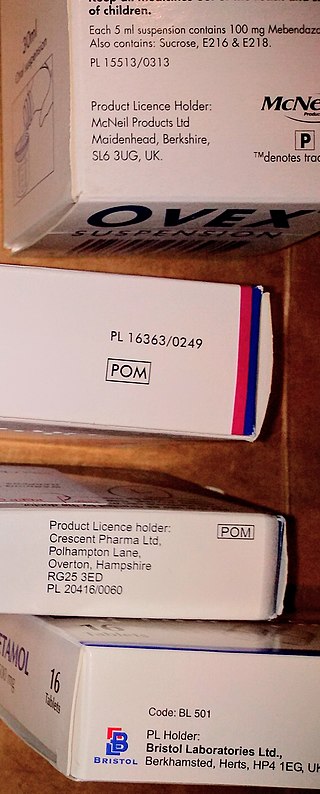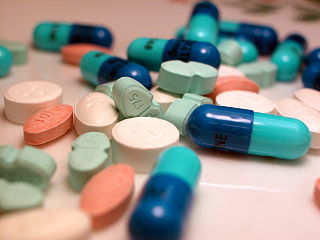
Pharmacy is the science and practice of discovering, producing, preparing, dispensing, reviewing and monitoring medications, aiming to ensure the safe, effective, and affordable use of medicines. It is a miscellaneous science as it links health sciences with pharmaceutical sciences and natural sciences. The professional practice is becoming more clinically oriented as most of the drugs are now manufactured by pharmaceutical industries. Based on the setting, pharmacy practice is either classified as community or institutional pharmacy. Providing direct patient care in the community of institutional pharmacies is considered clinical pharmacy.

A prescription, often abbreviated ℞ or Rx, is a formal communication from a physician or other registered healthcare professional to a pharmacist, authorizing them to dispense a specific prescription drug for a specific patient. Historically, it was a physician's instruction to an apothecary listing the materials to be compounded into a treatment—the symbol ℞ comes from the first word of a medieval prescription, Latin recipere, that gave the list of the materials to be compounded.

A prescription drug is a pharmaceutical drug that is permitted to be dispensed only to those with a medical prescription. In contrast, over-the-counter drugs can be obtained without a prescription. The reason for this difference in substance control is the potential scope of misuse, from drug abuse to practicing medicine without a license and without sufficient education. Different jurisdictions have different definitions of what constitutes a prescription drug.
A polypill is a type of drug combination consisting of a single drug product in pill form and thus combines multiple medications. The prefix "poly" means "multiple", referring to the multiplicity of distinct drugs in a given "pill". In precise usage, a pill is a polypill if it contains at least 4 drugs. An occasional synonym is combopill. A polypill is commonly targets treatment or prevention of chronic conditions.
An independent pharmacy is a retail pharmacy that is not directly affiliated with any chain of pharmacies and is not owned by a publicly traded company. Independent pharmacies are pharmacist-owned, privately held businesses in varying practice settings. They include single-store operations, pharmacist-owned multiple store locations, franchise, compounding, long-term care (LTC), specialty, and supermarket pharmacy operation. Independent pharmacy owners generally have more flexibility to build personalized customer relationships and they strive to differentiate their services from big-chain corporations.
Pharmacotherapy, also known as pharmacological therapy or drug therapy, is defined as medical treatment that utilizes one or more pharmaceutical drugs to improve on-going symptoms, treat the underlying condition, or act as a prevention for other diseases (prophylaxis).

A hospital pharmacy is a department within a hospital that prepares, compounds, stocks and dispenses inpatient medications. Hospital pharmacies usually stock a larger range of medications, including more specialized and investigational medications, than would be feasible in the community setting. Hospital pharmacies may also dispense over-the-counter and prescription medications to outpatients.

An auxiliary label is a label added on to a dispensed medication package by a pharmacist in addition to the usual prescription label. These labels are intended to provide supplementary information regarding the safe administration, use, and storage of the medication. Auxiliary labels provide information which can augment but not replace verbal counselling from a pharmacist.

In the field of pharmacy, compounding is preparation of custom medications to fit unique needs of patients that cannot be met with mass-produced products. This may be done, for example, to provide medication in a form easier for a given patient to ingest, or to avoid a non-active ingredient a patient is allergic to, or to provide an exact dose that isn't otherwise available. This kind of patient-specific compounding, according to a prescriber's specifications, is referred to as "traditional" compounding. The nature of patient need for such customization can range from absolute necessity to individual optimality to even preference.
A veterinary pharmacist is a specially trained pharmacist who dispenses veterinary drugs and supplies or products and advice to owners of companion animals and livestock. In addition, they advise the regulatory bodies and are involved in the formulation of veterinary drugs. Veterinary pharmacy is a field of pharmacy practice, in which veterinary pharmacists may compound medications, fill prescriptions, and manage drug therapies for animals. Veterinary pharmacists are licensed pharmacists who specialize in the distribution of medications for animals.

First Databank (FDB) is a major provider of drug and medical device databases that help inform healthcare professionals to make decisions. FDB partners with information system developers to deliver useful medication- and medical device-related information to clinicians, business associates, and patients. FDB is part of Hearst and the Hearst Health network.

A pharmacy is a retail shop which provides pharmaceutical drugs, among other products. At the pharmacy, a pharmacist oversees the fulfillment of medical prescriptions and is available to counsel patients about prescription and over-the-counter drugs or about health problems and wellness issues. A typical pharmacy would be in the commercial area of a community.
Medication costs, also known as drug costs are a common health care cost for many people and health care systems. Prescription costs are the costs to the end consumer. Medication costs are influenced by multiple factors such as patents, stakeholder influence, and marketing expenses. A number of countries including Canada, parts of Europe, and Brazil use external reference pricing as a means to compare drug prices and to determine a base price for a particular medication. Other countries use pharmacoeconomics, which looks at the cost/benefit of a product in terms of quality of life, alternative treatments, and cost reduction or avoidance in other parts of the health care system. Structures like the UK's National Institute for Health and Clinical Excellence and to a lesser extent Canada's Common Drug Review evaluate products in this way.
Pharmacy automation involves the mechanical processes of handling and distributing medications. Any pharmacy task may be involved, including counting small objects ; measuring and mixing powders and liquids for compounding; tracking and updating customer information in databases ; and inventory management. This article focuses on the changes that have taken place in the local, or community pharmacy since the 1960s.

Pharmaceutical packaging is the packages and the packaging processes for pharmaceutical preparations. It involves all of the operations from production through drug distribution channels to the end consumer.

Boots UK Limited, trading as Boots, is a British health and beauty retailer and pharmacy chain in the United Kingdom and operates also internationally including Ireland, Italy, Norway, the Netherlands, Malta, Thailand and Indonesia.

A New England Compounding Center meningitis outbreak that began in September 2012 sickened 798 individuals and resulted in the deaths of more than 100 people. In September 2012, the Centers for Disease Control and Prevention, in collaboration with state and local health departments and the Food and Drug Administration (FDA), began investigating a multistate outbreak of fungal meningitis and other infections among patients who had received contaminated steroid injections from the New England Compounding Center (NECC) in Framingham, Massachusetts. The NECC was classified as a compounding pharmacy. The traditional role of compounding pharmacies is to make drugs prescribed by doctors for specific patients with needs that can't be met by commercially available drugs.

Deprescribing is described as a patient-centred process to taper or stop medications with the intention to achieve improved health outcomes by reducing exposure to medications that are potentially either harmful or no longer required. Deprescribing is important to consider with changing health and care goals over time, as well as polypharmacy and adverse effects. Deprescribing can improve adherence, cost, and health outcomes but may have adverse drug withdrawal effects. More specifically, deprescribing is the planned and supervised process of intentionally stopping a medication or reducing its dose to improve the person's health or reduce the risk of adverse side effects. Deprescribing is usually done because the drug may be causing harm, may no longer be helping the patient, or may be inappropriate for the individual patient's current situation. Deprescribing can help correct polypharmacy and prescription cascade.
Specialty drugs or specialty pharmaceuticals are a recent designation of pharmaceuticals classified as high-cost, high complexity and/or high touch. Specialty drugs are often biologics—"drugs derived from living cells" that are injectable or infused. They are used to treat complex or rare chronic conditions such as cancer, rheumatoid arthritis, hemophilia, H.I.V. psoriasis, inflammatory bowel disease and hepatitis C. In 1990 there were 10 specialty drugs on the market, around five years later nearly 30, by 2008 200, and by 2015 300.
Omnicell, Inc. is an American multinational healthcare technology company headquartered in Mountain View, California. It manufactures automated systems for medication management in hospitals and other healthcare settings, and medication adherence packaging and patient engagement software used by retail pharmacies. Its products are sold under the brand names Omnicell and EnlivenHealth.












